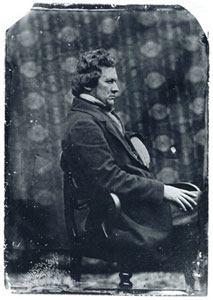Alexander Greek Thomson
| Alexander "Greek" Thomson | |
|---|---|
 |
|
| Born |
9 April 1817 Balfron, Scotland |
| Died | 22 March 1875 (age 57) Glasgow, Scotland |
| Nationality | Scottish |
| Citizenship | United Kingdom |
| Occupation | Architect |
| Buildings | Caledonia Road Free Church, Queen's Park United Presbyterian Church, St. Vincent Street Church, Holmwood House, Craigrownie Castle & others at Cove, Argyll |
Alexander "Greek" Thomson (9 April 1817 – 22 March 1875) was an eminent Scottish architect and architectural theorist who was a pioneer in sustainable building. Although his work was published in the architectural press of his day, it was little appreciated Glasgow during his lifetime. It has only been since the 1950s and 1960s that his critical reputation has revived—not least of all in connection with his probable influence on Frank Lloyd Wright.
Henry-Russell Hitchcock wrote of Thomson in 1966: “Glasgow in the last 150 years has had two of the greatest architects of the Western world. C.R.Mackintosh was not highly productive but his influence in central Europe was comparable to such American architects as Louis Sullivan and Frank Lloyd Wright. An even greater and happily more productive architect, though one whose influence can only occasionally be traced in America in Milwaukee and in New York City and not at all as far as I know in Europe, was Alexander Thomson.”
Thomson was born in the village of Balfron in Stirlingshire. The son of John Thomson, a bookkeeper, and Elizabeth Cooper Thomson, he was the ninth of twelve children. His father, who already had eight grown children from his previous marriage, died when Alexander was seven. The family consequently moved to the outskirts of Glasgow, but tragedy struck when the eldest daughter, Jane, and three of her brothers died between 1828 and 1830, the year that Alexander's mother died. The remaining children moved with one of the older brothers, William, a teacher, and his wife and child to Hangingshaw, just south of Glasgow. The Thomson boys all worked from a young age, but the children were also home schooled. It is believed that Alexander worked in a lawyer's office, possibly Wilson, James, and Kays, where his older brother, Ebenezer, was employed as a bookkeeper and where he later became a partner in the business.
...
Wikipedia
